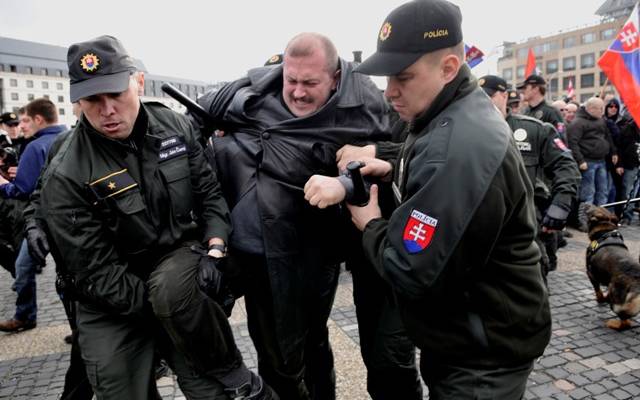In “a completely new situation,” Neo-Nazis have gained traction in the Slovakian political arena.
The leftist ruling party has won the parliamentary election in Slovakia, after campaigning on an anti-migrant ticket, but will need coalition partners to form a majority government, according to results announced on Sunday.
In a surprising development, a neo-Nazi party gained parliamentary seats for the first time.
With the votes from 99.9 percent of the almost 6,000 polling stations counted by the Statistics Office Sunday, the Smer-Social Democracy party of Prime Minister Robert Fico is the winner with 28.3 percent of the vote, or 49 seats in the 150-seat Parliament.
That represents a significant drop in support from the 2012 election when Smer took 44.4 percent and was able to govern alone.
Fico acknowledged he had hoped for at least 4-5 percent more but still called it “a decent result.”
The prime minister favors a strong state role in the economy, has been critical of Western sanctions against Russia and is known for strong anti-Muslim rhetoric. Slovakia has not been part of the European route that hundreds of thousands of refugees are using, and a recent teachers strike over low pay, nurses quitting hospitals en masse and corruption scandals in the health care system have overshadowed the migrant crisis in the country. Still, Fico had made it the central tenet of his campaign.
The pro-business Freedom and Solidarity became the second strongest party with 12.1 percent, or 21 seats, ahead of another center-right party, the Ordinary People with 11.0 percent.
The ultra-nationalist Slovak National Party, Fico’s potential partner, returned to Parliament after a four-year-absence with 8.6 percent while the traditional party in the predominantly Roman Catholic country of 5.4 million, the Christian Democrats, didn’t get enough votes to be represented.
Most notably, the neo-Nazi People’s Party – Our Slovakia, got 8 percent, or 14 seats.
Party chairman Marian Kotleba was chairman of the banned neo-Nazi Slovak Togetherness-National Party, which organized anti-Roma rallies and expressed sympathy for the Slovak Nazi-puppet state during World War II.
The party says NATO is a terrorist organization and keeps attacking the European Union and Europe’s common currency, the euro, which Slovakia uses.
Kotleba is not a newcomer. In 2013, he was elected the head of a regional government and he once displayed a banner from a window of his office in the central city of Banska Bystrica that read: “Yankees, go home,” and “Stop NATO.”
Foreign Minister Miroslav Lajcak said that after Kotleba’s success “the perception of Slovakia in Europe will be complicated. We have elected a fascist to Parliament.”
Martin Slosiarik, the head of the Focus polling agency, said those who were voting for Kotleba did it to punish the traditional parties.
“Some 70 percent of his voters are young people and those in the middle age and they apparently expected more from the system,” he said, adding Kotleba offered a “clear and simple message.”
Fico said it is his duty as the winner to create a meaningful government. He said he will open a first round of informal consultations with other parties Sunday.
Tough negotiations are expected at a time when Slovakia is getting ready to take over the rotating presidency of the European Union for the second half of 2016.
“The formation of the government will take longer than before,” Fico said.
Slosiarik said he was skeptical about his chance to succeed.
“Such a government would not be ideologically clear, it would have to involve parties across the political spectrum,” he said. “It’s a completely new situation.”
By: AP
